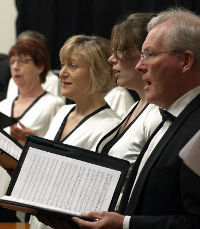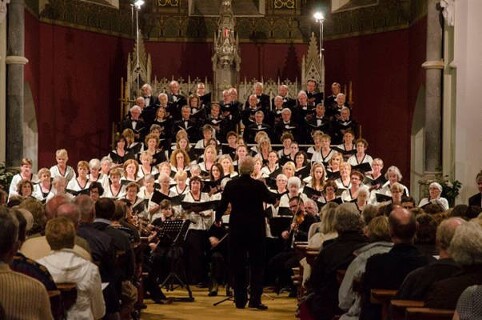
Thank you ...
Special thanks to our new principal Corporate Sponsor DPS Engineering who are committed to the Choir for three years commencing January 2016, and also to our new Corporate Partner Spirit Motor Group.

To be announced ...
The next concert will be announced soon.

The Guinness Choir

Guinness Choir
The Guinness Choir was established in 1951 by Victor Leeson, who was a young member on the management staff of the Guinness Brewery in Dublin. The members of the Choir were also Guinness employees. The Choir (initially known as the St James's Gate Musical Society) gave its first performance when the Rupert Guinness Hall was opened in May 1951. The Choir subsequently became known as the Guinness Choir, and has been at the forefront of choral music in Ireland for over 50 years. Victor Leeson conducted the Choir from its foundation in 1951 until 1984. He was truly inspirational in the growth and direction of the Choir, and early performances included the great oratorios of Bach and Handel, many of which were performed in Dublin for the first time. As well as Bach and Handel, the Choir's repertoire now encompasses many of the choral works of all the major composers from the 17th to 20th centuries, including Britten, Stravinsky, Pärt, Mahler and Verdi.
On Victor Leeson's retirement in 1984, John Dexter was appointed as Musical Director. The Choir gave many notable performances under his direction, including the Irish premiere of Andrew Lloyd Webber's Requiem, Bach's St Matthew Passion, Elgar's The Apostles and The Music Makers, and Walton's Belshazzar's Feast. David Milne has been the Guinness Choir's Musical Director since 1991. With his inspirational direction, it has continued to grow in stature and renown. While the Choir performs mostly in Dublin, it has given a number of concerts elsewhere; in recent times in Germany in April 2006, and in November 2007 a very successful performance of the Verdi Requiem at the Waterfront Hall in Belfast, in conjunction with the Belfast Philharmonic Choir and the Ulster Orchestra.
Recent performances include Intimations of Immortality by Gerald Finzi and A Spring Symphony by Benjamin Britten, and an all-Bach concert of the cantata Wachet Auf, the Magnificat and the Suite in D performed with the Ulster Orchestra. In 2009 the Choir performed Handel's Solomon as part of the Dublin Handel Festival - celebrating Handel 250. In December 2009 we sang Messiah to great acclaim in the new Wexford Opera House.
In 2010 we performed Hymnus Paradisi by Herbert Howells and Hymn of Jesus by Gustav Holst, two works of the twentieth century from two outstanding English composers. We rounded off that year with two snowy performances of Bach's Christmas Oratorio in Wexford and Dublin. In April 2011 we joined forces with the University of Dublin Choral Society to perform Verdi's Requiem in the Grand Canal Theatre. This tremendous performance was part of the celebrations marking 300 years of Medicine, Chemistry and Botany at Trinity College. In January 2012 we sang Mendelssohn's Elijah, and later, in May, Bach's B Minor Mass, both in the RDS Concert Hall.

The Choir at Clifden
In January 2013 we presented an all-Handel concert, performing Dixit Dominus and The Ways of Zion Do Mourn, and later took part in a performance of Beethoven's Choral Fantasy with the RTE National Symphony Orchestra in the National Concert Hall. We finished that season with a performance of another of Beethoven's great works - his Mass in C. In September 2013 we began our season with a highly successful performance of Handel's Messiah as part of the prestigious Clifden Arts Festival, and continued in December 2013 with Rossini's Petite Messe Solenelle in St Peter's Church, Phibsborough. Our final performance of that season, in March 2014, was Bach's St Matthew Passion in St Patrick's Cathedral.
We began our 2014/2015 season in October with a performance of Haydn's Creation, and concluded in May with The Apostles, one of Elgar's great masterpieces.
The Guinness Choir is a fixture of the modern choral landscape in Ireland and a name that is synonymous with excellence, professionalism and sheer love of music.